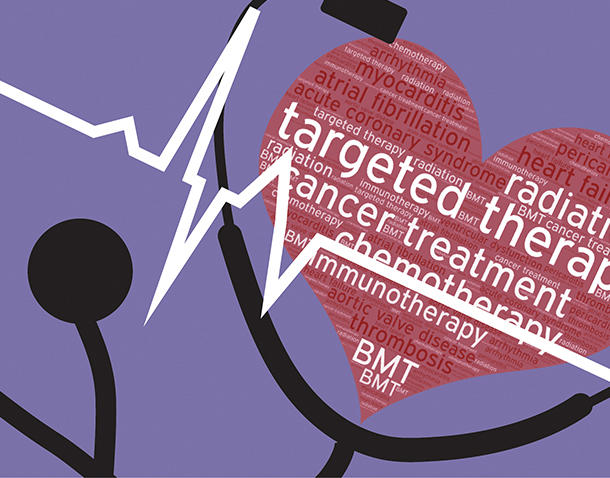Most Asian Female Breast Cancer Patients Are Unaware That Chemotherapy Will Harm The Heart
Source: Thailand Medical News Nov 13, 2019 6 years, 1 month, 2 weeks, 4 days, 1 hour, 4 minutes ago
In a surprising survey, it came to light that almost 65% of
breast cancer patients in Asia are not aware that chemotherapies, radiation or even immunotherapies will damage their heart nor are they forewarned by their doctors or oncologists and neither is proper monitoring of
heart issues after post cancer treatments, put into place by the medical professionals.

Most cancer therapies can impact the
heart. In addition to anthracyclines (doxorubicin), which can build up unwanted calcium in the heart muscle, immunotherapy and tyrosine kinase inhibitors can cause left-ventricle damage. Radiation therapy may lead to a thickening of the
heart valves, inflammation, and artery blockages.
Advanced and better treatments for
breast cancer have contributed to the growing number of
breast cancer survivors. However, these women may face a heightened risk of
heart disease from the cardiotoxic effects of chemotherapy and radiation, according to a statement from the American Heart Association in the Feb. 20, 2018, issue of
Circulation. However, doctors and oncologists in Asia do not take the effort to warn their patients about these neither do they put into place proper heart checkups before and after after cancer treatments.
Physicians and healthcare professionals have long known that certain cancer drugs can decrease the heart's pumping ability, especially doxorubicin (Adriamycin) and trastuzumab (Herceptin), two common treatments for
breast cancer. Many women receive
radiation therapy as well, which can cause heart tissue to scar or stiffen, possibly leading to valve disorders, coronary artery disease, or other
heart problems. But specialists who focus on keeping the
heart healthy during and after cancer treatment known as cardio-oncologists can offer strategies to both prevent and treat
heart damage from cancer therapy. The problem is that they are not many qualified cardio-oncologists in Asia!
Before,
cardio-oncologists mainly treated people who developed heart-related symptoms after cancer therapy. "These days, more people are seeing cardio-oncologists before undergoing cancer treatment," says Dr. Tomas Neilan, director of the
cardio-oncology program at Harvard-affiliated Massachusetts General Hospital in a phone interview with
Thailand Medical News.
This procedure is similar to what doctors refer to as clearance for surgery, during which a primary care physician or cardiologist evaluates a person's cardiovascular health before a major operation. In both cases, the goal is finding ways to minimize the patient's risk.
For instance, Dr. Neilan recently saw a 66-year-old woman newly diagnosed with
breast cancer. "I changed her blood pressure regimen to include a more effective drug that may have a secondary benefit of protecting her
heart during chemotherapy," he says. To track any possible changes to her
heart, she will receive a heart ultrasound ie echocar
diogram or "echo" to check for heart abnormalities before and six months after starting doxorubicin.
Cancer treatment guidelines recommend that surveillance schedule for most patients taking doxorubicin and similar drugs, known as anthracyclines. About 30% of women with
breast cancer receive trastuzumab; they are supposed to have an echo every three months during treatment. Early diagnosis and treatment of a weakened, damaged
heart (
heart failure) may improve survival.
However, when
Thailand Medical News contacted 2 leading private hospitals in Bangkok, none had a
cardio-oncologists on board and when speaking to many oncologists, many said that their primary concern was only about the treating cancer and if the patients did develop heart issues, they were welcome to see a cardiologist. Speaking to oncologists In Malaysia, Indonesia and also Philippines was even more depressing as 6 leading oncologists who were spoken to in these countries claimed that they did not know cancer therapies affected the heart in any way!
For
breast cancer patients, strategies that may help are exercise, statins, and aggressive blood pressure control. "There are consistent data showing that for women with
breast cancer, physical activity not only improves survival, it also decreases the risk of heart injury related to
breast cancer treatment," says Dr. Neilan. He recommends exercising for 30 to 45 minutes at least five days a week.
Preliminary evidence suggests that statins (which are widely prescribed to lower
heart disease risk) may help preserve
heart function when taken during chemotherapy. Dr. Neilan is currently heading a clinical trial to further test this observation. In addition, aiming for the recently updated blood pressure targets, which were lowered to a goal of 130/80 millimeters of mercury or less, will also likely protect the heart during chemotherapy and radiation, he adds.
Giving advice to Asian
breast cancer patients, Dr Neilan’s overall message is positive. "We're piggybacking on the phenomenal success of oncologists," he says. If you're diagnosed with cancer, do whatever your oncologist recommends, he stresses. Whatever happens from a cardiovascular perspective can usually be addressed.
All
breast cancer survivors should stay vigilant for any new heart-related symptoms during and after treatment and report them right away to their physician. Common symptoms include shortness of breath, weakness, fatigue, or a rapid, irregular heartbeat.
Hospitals, doctors and oncologists should also warn patients about the possible side effects of various
cancer treatments and also more protocols involving monitoring the
heart functions before and after cancer treatments should be put into place. Hospitals offering cancer treatments should also get at least one
cardio-oncologists onboard its team .
References:
Circulation (2018). DOI: 10.1161/CIR.0000000000000556
Long-term heart-specific mortality among 347 476 breast cancer patients treated with radiotherapy or chemotherapy: a registry-based cohort study
Janick Weberpals, Lina Jansen, Oliver J Müller, Hermann Brenner
European Heart Journal, Volume 39, Issue 43, 14 November 2018, Pages 3896–3903, https://doi.org/10.1093/eurheartj/ehy167 